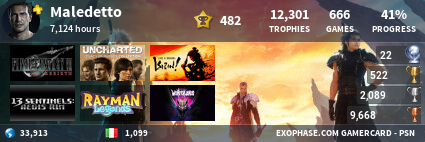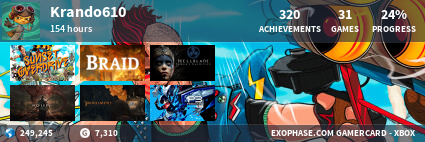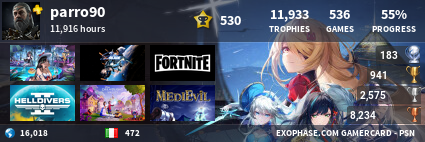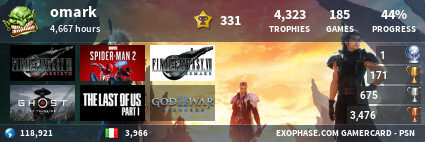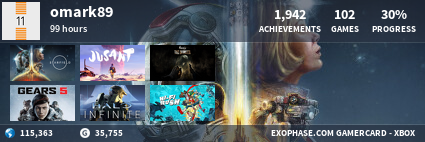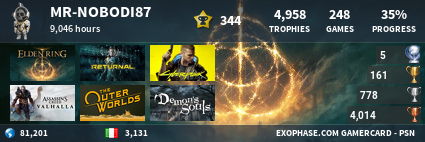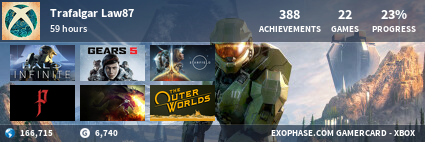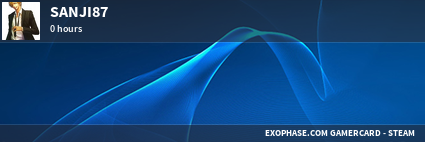Installa l'app
Come installare l'app su iOS
Segui il video qui sotto per vedere come installare il nostro sito come web app sulla tua schermata principale.
Nota: Questa funzionalità potrebbe non essere disponibile in alcuni browser.
Pubblicità
Stai usando un browser non aggiornato. Potresti non visualizzare correttamente questo o altri siti web.
Dovreste aggiornare o usare un browser alternativo.
Dovreste aggiornare o usare un browser alternativo.
Ufficiale PlayStation Studios | News e Rumors su SIE | News: 80,3 Milioni di Console distribuite
- Autore discussione zaza50
- Data d'inizio
ufficiale
Pubblicità
Hicks
Legend of forum
- Iscritto dal
- 2 Feb 2009
- Messaggi
- 9,464
- Reazioni
- 2,249
Online
Madonna stavo guardando qualche prima comparison per Days Gone remastered (basata sul trailer e su versione PC che credo sia identica a quella PS5).
Non ci sono miglioramenti. Zero (se ci sono sono invisibili). Queste operazioni andrebbero impedite/boicottate
Questa è la Sony senza concorrenza
Non ci sono miglioramenti. Zero (se ci sono sono invisibili). Queste operazioni andrebbero impedite/boicottate
Questa è la Sony senza concorrenza
Offline
E come glielo impedisci?Madonna stavo guardando qualche prima comparison per Days Gone remastered (basata sul trailer e su versione PC che credo sia identica a quella PS5).
Non ci sono miglioramenti. Zero (se ci sono sono invisibili). Queste operazioni andrebbero impedite/boicottate
Questa è la Sony senza concorrenza

Blackcat73
Legend of forum
- Iscritto dal
- 2 Nov 2008
- Messaggi
- 17,299
- Reazioni
- 5,316
Offline
Negalo tu uno spot a chi ti farà vendere carrettate di console...A me basterebbe che selezionassero meglio i giochi... cioè mettermi l'adv di wwe25k mi cadono i coglioni sinceramente
- Iscritto dal
- 9 Set 2019
- Messaggi
- 2,872
- Reazioni
- 1,703
Offline
Come fatto con i vari Concord, Lego Horizon e simili. Non comprando.E come glielo impedisci?
Inviato dal mio SM-S901B utilizzando Tapatalk
- Iscritto dal
- 5 Lug 2007
- Messaggi
- 55,049
- Reazioni
- 10,487
Offline
Come fatto con i vari Concord, Lego Horizon e simili. Non comprando.
Inviato dal mio SM-S901B utilizzando Tapatalk
E' una remaster, dovrebbe vendere letteralmente 0 per essere un fallimento.
Con tipo 200k vanno in attivo.
Offline
Quello è boicottare. Impedire vuol dire che non lo fanno proprio. E da che mondo e mondo faranno sempre remake/remastered fino alla fine dei tempi.Come fatto con i vari Concord, Lego Horizon e simili. Non comprando.
Inviato dal mio SM-S901B utilizzando Tapatalk
Inuyasha1550
Legend of Gallowmere
Offline
Impedire è sbagliato, va sicuramente ripensato il modo di distribuzione perchè tornare a chiedere altri 10€/$ a chi il gioco l'aveva supportato fin dall'inizio su PS4 così come 50€ per gli ultimi arrivati in cambio di un prodotto fotocopia non ha il minimo senso.
Con un upgrade gratuito puoi tranquillamente smuovere la vecchia versione (Fallout 4 docet), che visto i prezzi è anche più facile arrivi a un pubblico nettamente superiore rispetto a 70/80€ di remake che nessuno ha chiesto.
Con un upgrade gratuito puoi tranquillamente smuovere la vecchia versione (Fallout 4 docet), che visto i prezzi è anche più facile arrivi a un pubblico nettamente superiore rispetto a 70/80€ di remake che nessuno ha chiesto.
omark
Aratore di Fagiani
Offline
omark
Aratore di Fagiani
Offline

Shuhei Yoshida looks back at 31 years at Sony PlayStation | exit interview
Shu Yoshida left Sony on January 15. He spent 38 years at Sony, including 31 years at PlayStation, and managed many of its big hits.
GamesBeat: In the game business, Sony was becoming much more global at the time. It wasn’t as focused on Japan. The decision-making became more global.
Yoshida: Absolutely. That process started in the Andrew House days. Jim Ryan kind of completed it. There was still a transition going on in some ways, but it was pretty much complete. It was a long process. More than five years. Bit by bit. Worldwide Studios was the exception. We were already global in 2005, but all the other parts of the company were divided. Each publisher had to send in three different masters to release games around the world.
Under Jim Ryan, the organization–he removed the individual headquarters. There was no more SCEA. Shawn Layden lost that job. There was no SCE Europe or SCE Japan. He reorganized everything into function-based groups. Global marketing, global sales, global third party, global PR. All the parts of the company became global. It was headquartered in the United States. Jim Ryan was in London, but it was a U.S.-based company. In Japan all the different groups reported to the U.S. or Europe.
GamesBeat: Did that make communication more difficult at first?
Yoshida: The implementation of that globalization was different for each function. The leaders of each different group–one group might treat Japan like a local regional office. The decisions would be made in the U.S. or Europe and later the people in Japan would learn about it. They wouldn’t know what the company was doing. But other groups integrated Japan and treated everyone in the U.S., Japan, or Europe the same. Anyone who could do the job best was assigned a global role. Global manager of this function might be in Japan or in London. A manager in Japan would be fully integrated with the headquarters discussions for that function. It was different for different functions.
GamesBeat: What do you think about how the structure of the business has changed? For a time you had the console cycles, about five years. Now it’s changed.
Yoshida: Right, it’s getting longer. The last cycle was seven years. If it’s seven years, we’ll see a new one in 2027. I have no information about the next PlayStation, but it feels a bit too early for me to say.
The PS5 generation was slowed down because of manufacturing issues.
If the next PlayStation comes out in 2028, that feels right to me. Microsoft had their leak about a 2028 plan. Maybe both of them will come out then. There are diminishing returns from the semiconductors.
GamesBeat: Why did you decide to retire?
Yoshida: Well, I haven’t retired. I left the company. Jim Ryan was the last leader of our generation. Ken Kutaragi, Kaz Hirai, Andrew House, Shawn Layden, myself, we were all the same group from the PS1 days. We handed down to the next generation of management, like Hideaki Nishino and Hermen Hulst. For the last five years my responsibility was to promote indie games inside and outside of PlayStation. I wanted to communicate, especially to new people joining PlayStation, how important it is to support indie games. They create the future. Externally I was communicating to indie developers and publishers that we wanted to make things better for them. Bit by bit, we’ve been able to improve our systems, our store functions, our communication.
A few years back, one of the reasons I got that job from Jim–we’d been criticized by the indie community. They said that PlayStation doesn’t care about indies. You don’t hear that kind of criticism anymore. Last year we had lots of anecdotes from our indie partners that their new games were selling better on PlayStation than any other platform. That’s amazing. Some games sold better on PlayStation than on PC. When I started that work five years ago, our indie partners would say that when they released their games multiplatform, the Switch version would sell three to five times more than PlayStation. Bit by bit, that gap has narrowed down. We have a strong team inside the company supporting indies.
Ultima modifica:
Hicks
Legend of forum
- Iscritto dal
- 2 Feb 2009
- Messaggi
- 9,464
- Reazioni
- 2,249
Online
- Iscritto dal
- 6 Apr 2010
- Messaggi
- 26,782
- Reazioni
- 5,513
Offline
Una vergogna.
- Iscritto dal
- 28 Mag 2010
- Messaggi
- 180,075
- Reazioni
- 81,207
Offline
Comunque era palese (quanto necroposting avrei fatto da più giovane), ora stanno semplicemente uscendo le cose poco alla volta ma per quanto bravo possa essere (e ha fatto un lavorone) non passi da Capo di PS a Capo degli Indie, era evidentissima retrocessione di carriera. Puoi essere bravissimo in contabilità e amare la contabilità, ma non passi da Capo Agenzia a Capo Contabile nell'agenzia se non vieni retrocesso. Con Layden invece han segato via tutto di netto senza alcuna possibilità di scelta.
E per la cronaca, anche passare dall'essere Co-CEO senza superiori se non il grande capo della compagnia, ad essere sotto il tuo ex Co-CEO non è esattamente una promozione, malgrado la PR l'abbia fatta passare come un "non cambiamento".
E per la cronaca, anche passare dall'essere Co-CEO senza superiori se non il grande capo della compagnia, ad essere sotto il tuo ex Co-CEO non è esattamente una promozione, malgrado la PR l'abbia fatta passare come un "non cambiamento".

Sora91
Veterano
- Iscritto dal
- 18 Feb 2010
- Messaggi
- 13,021
- Reazioni
- 4,818
Offline
Facciamo uscire (o non uscire) dollaro e poi si passa al next stepPer la cronaca, anche passare dall'essere Co-CEO senza superiori se non il grande capo della compagnia, ad essere sotto il tuo ex Co-CEO non è esattamente una promozione, malgrado la PR l'abbia fatta passare come un "non cambiamento".

- Iscritto dal
- 28 Mag 2010
- Messaggi
- 180,075
- Reazioni
- 81,207
Offline
Se HorizonO e $ floppano non vedo altre vie, questi sono tutti figli suoi e a torto o a ragione è impensabile che non si stia giocando il futuro su sta roba.Facciamo uscire (o non uscire) dollaro e poi si passa al next step
Pubblicità
Condividi:
Pubblicità

